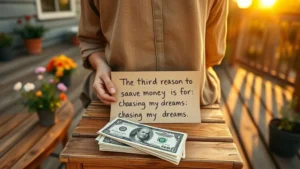Start With One Win
Okay, real talk for a sec—can I tell you the weirdest thing that ever helped my bank account? I once set up this automatic $25 transfer into a savings account. Forgot about it for like six months… then checked, and bam—there was enough for a spontaneous beach trip. All from a move that felt, honestly, kinda pointless at first. That’s the magic of tiny habits, and it’s honestly a huge part of the best financial advice for 25 year olds I could ever give.
You don’t need a huge salary, or five side hustles, or to say goodbye to takeout forever. What really matters: stacking small, easy wins and letting those good choices pile up. Money “adulting” can feel impossible, but you’ve totally got this. Ready? Let’s unstress your wallet—story time, real tips, awkward mistakes, and all.
Why Saving Young Feels Like Cheating
How Much Difference Does It Make?
No joke, if you start saving in your twenties, you get to cheat a little—because time makes your money do a ton of the work. Ever heard of compound interest? It’s like a snowball that rolls itself downhill (but with cash instead of freezing-slush). Get this: saving just $50 a week from age 25 could land you over $160K at retirement, thanks to all those years of growth research on young adult savings.
Can you picture opening your savings app and seeing that? My friend started socking away tiny amounts early—just enough to feel the pinch, but not enough to miss going out for sushi now and then. By 30, she’d piled up enough for a whole cross-country trip (and that’s after two random car repairs). The 10 financial tips for young adults post lays this out so clearly—it’s not even about being “frugal,” it’s just about letting your cash marinate over time.
Table: Saving At 25 vs. 35 (Why Time Matters)
| Age You Start | Monthly Savings | Years To Grow | Value @ 7% Annual Return |
|---|---|---|---|
| 25 | $50 | 30 | ~$61,500 |
| 35 | $50 | 20 | ~$24,500 |
Quick math shows it’s not about how much you stash—it’s about when you start.
Debt Isn’t the Enemy (But Interest Is)
Student Loans Getting You Down?
If you wake up at night thinking about your loan balance, welcome to the club (I’ve had those “what’s the point” spiral-thoughts too). But here’s a tiny shift: don’t look at your debt as a monster, but as a puzzle to solve, piece by piece. Most pros suggest knocking out high-interest loans first—think credit cards over government loans. Even an extra $20 to your payment can chop off years of interest (expert advice for millennials).
I know someone who took the money they usually spent on Ubers and, for three months, sent it to student loans instead. It hurt for a while (rain + walking = not cute shoes) but they shaved off almost a whole year of payments. That’s the kind of strategic swap that, over time, really adds up.
Debt Payoff: Two Easy Methods
- Snowball: Pay off your smallest loan first, then use that payment on the next biggest. Feels rewarding, gets momentum going.
- Avalanche: Pay the loan with the highest interest rate first (usually credit cards).
Want real-life Financial habits examples? Try tracking what you pay in interest in a single month. Spoiler: it’s a huge motivator to pay down that debt faster.
The Safety Net You WON’T Regret
How Much Emergency Fund Do You Really Need?
No one tells you this, but an emergency fund is the confidence boost you didn’t know you needed. It’s not just to avoid disaster (car breakdown, dental pain, surprise vet visit). It’s to stop that panicky feeling when things go sideways…
A Reddit poster said the single best move for young adults was stashing $1,000 as fast as possible. They called it a “life buffer”—and they’re not wrong. Once you hit that, aim for 3–6 months of living expenses (but again, no pressure, just build what you can). And please, put it in a “hard to touch” online savings account. Make it automatic. Out of sight, out of mind… until you need it.
Where Do You Stash It?
- Separate savings account (not your main one)
- High-yield savings or money market (find best rates!)
- Set consistent, automatic transfers—try $25 every payday
I once covered a flat tire and a mini health scare… without racking up another credit card bill. Honestly, being able to say “I’ve got this” might be the best financial advice for 25 year olds—it’s pure peace of mind.
For more peace-of-mind moves, check out the classic list of 10 financial tips for young adults. These always come up in personal finance circles (because people swear by them!).
Budget Without Boredom
Where’s Your Money Hiding?
Some people hear “budget” and picture sad spreadsheets or apps they never open. (Been there.) But what if you treat it like a game: find that secret $5 you didn’t know you were wasting. Still not convinced? Ok, think of it this way—budgeting is just paying attention. Not restricting yourself, but noticing where your money actually goes. Most people are shocked by what they discover (takeout? Amazon? Streaming subscriptions they forget about?).
Try looking at your last month of transactions with a highlighter—needs in one color, fun in another. I promise, you’ll instantly spot places for painless cuts (“Wait, $60 for coffee?!”). For a budget to stick, be honest about what makes you happy…and let yourself spend on it, guilt-free. Just cut somewhere you don’t care as much.
Table: Needs vs. Wants, and How To Tweak It
| Category | Needs (Essentials) | Wants (Treats) | Your Move |
|---|---|---|---|
| Food | Groceries ($250) | Takeout ($75) | Try meal-prepping for an extra two weeks |
| Transport | Gas/Bus ($100) | Lyft/Uber ($40) | Walk or bike for one week instead |
| Shopping | New work shoes ($40) | Clothes haul ($50) | Set a “wait 48hrs” rule for fun buys |
For more bad financial habits to avoid—and to see what habits really trip people up—check out these Financial habits examples.
Here’s a trade secret: review your budget once a month (wine helps). Even if you change nothing, just staying aware makes you less likely to splurge without thinking.
Investing Isn’t Only for Geniuses
Scared Of Stocks? You’re Not Alone
Honestly, the world of investing can feel like a confusing soup of jargon—IRAs, TFSAs, mutual funds… who made up these names? But investing early is kind of the holy grail of the best financial advice for 25 year olds. Why? Because the magic of compound growth isn’t just for math nerds or “lucky” people. It’s for anyone who can automate a little cash transfer and leave their money alone.
Look, you don’t have to know everything to get started. A bunch of super-savvy Reddit folks say to just “set and forget” by picking a low-cost index fund (think: S&P 500 or a total market fund) and dumping in whatever you can—$50, $100, whatever feels doable. Don’t stress about beating the market or getting rich quick. It’s all about being in the game early (young investor success stories).
How To Get Rolling
- Start with a Roth IRA or, for Canadians, a TFSA (Tax-Free Savings Account)—even if it’s $20 a month.
- Set up automatic investments so you don’t have to think about it.
- Every time you get a raise, bump up your contribution—even just 1%.
If you want local tips, consider reading up on Financial planning for Young Adults illinois because some tax perks or employer programs depend on where you live. Small moves today = big wins tomorrow. Your future self, basking on a patio, will thank you.
Don’t Let Lifestyle Creep Win
What Even Is Lifestyle Creep?
Ever get a pay raise and suddenly find yourself spending more… but not really feeling happier? That’s lifestyle creep! It sneaks in like an overpriced oat latte. When your paycheck goes up, let your saving go up too. Set it and forget it, and leave the rest for fun.
One person I know started auto-increasing their 401(k) contributions every time they got a raise—didn’t even notice until they saw the balance a few years later. The best part? They still went out, traveled, lived life… just with more peace of mind. No guilt, just smarter habits.
Need a guide to check yourself? Try the list in 10 financial tips for young adults. It’s the stuff you wish they’d taught in school (without the boring lectures).
Save, Automate, Repeat
Why Automation Wins (And Makes Adulting Way Easier)
You know that feeling when you’re about to buy something dumb online… but your checking account is already looking “bare”? Setting up automatic transfers puts future-you first—pay yourself before the world gets a chance to. Even $10 a week, moved automatically, means you’ll never forget. And if you don’t see it, you don’t spend it.
This is honestly the top trick behind every “money success story” I’ve heard. Don’t trust yourself to remember. Out of sight, out of mind. Best financial advice for 25 year olds? Make your saving and investing mindless. You will not regret it.
Still feeling uncertain? There are tons of easy, step-by-step plans out there, including super practical tips in 10 financial tips for young adults and the specific local moves in Financial planning for Young Adults illinois. You’ll find something that feels doable for you—promise.
Reflection, Habits, and Laughing At Your Own Mistakes
Let’s get real for a second: nobody does it right all the time. I’ve made every dumb money mistake you can think of—late-night food runs, party outfits worn once, half-finished subscriptions. But every time, I learned one little habit to try next time. Eventually, those stuck. Financial freedom isn’t “never buying fun stuff again.” It’s feeling safe, knowing you’ve got yourself covered, and still living your life.
So… what do you want to try now? A $25 auto-setup? A week tracking spending (be honest—were you surprised)?If you start with just one habit, you’re already way ahead of most people. Make it easy. Make it automatic. Laugh a little when you mess up. The point isn’t perfection, it’s progress—you in a year, in five years, will be amazed at how these tiny moves stack up.
You’ve Got This—Your Money, Your Rules
Whew, that was a journey. If you’ve stuck with me, you already care more about your future than you probably realize. The best financial advice for 25 year olds isn’t some magic formula—it’s stacking wins, cutting yourself slack, and asking dumb questions when you need to (because everyone else is, trust me).
Your next step? Just pick one idea from above and give it a shot. Track where your cash vanishes, start a tiny emergency stash, or finally open that investment account you’ve been putting off. Look at bad financial habits for a reminder of what to skip, and use 10 financial tips for young adults when you want a bigger jump-start. Curious about what’s specific in your area? Check out Financial planning for Young Adults illinois and see if there are benefits local to you.
Go make that first small change—you’ll blink and realize you’ve built habits that make life a whole lot easier. Your future is cheering you on. Ready?













